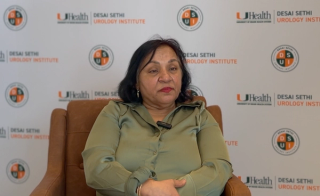
Prostate Cancer
Latest News
Latest Videos

CME Content
More News

At 5 years, 95.8% of patients in the SBRT arm were free from biochemical or clinical failure compared with 94.6% of patients in the control radiotherapy arm.

“So, this study is really getting at that question, could radiation target the lesions that we see on PET, and could we delay hormone therapy for men?” says Bridget Koontz, MD.

Oliver Sartor, MD, discusses how a 70-year-old man with PSMA-positive metastatic castration-resistant prostate cancer (mCRPC) represents a typical candidate for PSMA-targeted imaging and potential radioligand therapy, considering factors such as disease progression, previous treatments, and overall health status in tailoring management strategies.

The application is supported by data from the pivotal phase 3 ARANOTE trial.

"My hope is that the results of our study improve the uptake of active surveillance, further reducing unnecessary treatments, and this, combined with the improving reflex tests, may change the risk-benefit of PSA screening," says Lisa F. Newcomb, PhD.

The panelist discusses how the ARANOTE trial demonstrated significant benefits of adding darolutamide to androgen deprivation therapy for patients with metastatic hormone-sensitive prostate cancer, showing improvements in radiographic progression-free survival and other key outcomes.

Fred Saad, CQ, MD, FRCS, FCAHS, discusses how darolutamide offers potential advantages over other androgen receptor–targeted therapies for metastatic prostate cancer, including its unique molecular structure, favorable safety profile, and efficacy in specific clinical scenarios.

“Nivolumab, combined with standard of care trimodality therapy, appears to be promising for the treatment of grade group 5 prostate cancer," says John Michael Bryant, MD.

"The TALAPRO-2 results provide much-needed hope to patients who remain in high unmet need for effective treatment options," said Neeraj Agarwal, MD, FASCO.

“We need to close that gap, and just as a general rule, screen our prostate cancer patients more closely for depression, especially those with androgen deprivation therapy,” says Mihir S. Shah, MD.

"We remain on track for the opening of phase 2 in the next few months. We also expect to see the full phase 1 results presented at a scientific meeting in 2025," says David E. Gauden, DPhil.

“We noticed that if you were White and had prostate cancer and received androgen deprivation therapy, you were more likely to be diagnosed with depression compared to your Black counterparts,” says Mihir S. Shah, MD.

The WATER IV PCa will assess Aquablation vs radical prostatectomy in patients with grade group 1 to 3 localized prostate cancer.

The panelist discusses how patient characteristics, disease factors, and individual health status guide the decision to include or avoid chemotherapy in combination treatments for metastatic prostate cancer, weighing potential benefits against risks and quality of life considerations.

Fred Saad, CQ, MD, FRCS, FCAHS, discusses how the inclusion of chemotherapy, particularly docetaxel, in combination therapies for metastatic prostate cancer alters the adverse event profile, noting that while the ARASENS trial found adverse effects to be largely consistent with previous docetaxel studies, they consider whether this aligns with observations in clinical practice.

"When we looked at the same phenotypic data, but focusing on each immunochemistry protein markers, we had 10 patients with AR negative tumor with clearly worse prognosis, and synaptophysin-positive and chromogranin A-positive patients also had a worse prognosis," says Cedric Pobel, MD.

"At the University of Michigan, we've actually started to offer prostate MRI without contrast for patients on active surveillance, which has been a really exciting change," says Benjamin Pockros, MD, MBA.

Pastuszak discusses the evolving nature of understanding how testosterone therapy post-radiation for prostate cancer may beneficial or harmful to patients, and how to navigate the decision.

Soumyajit Roy, MS, MBBS, explains how findings showing 5-year biochemical recurrence status may predict prostate cancer cure should alter the clinician-patient interaction.

At the 24-month time point, patients who received apalutamide had a 23% reduction in the risk of death compared with patients who initiated enzalutamide.

Findings from RAPTOR suggest 5-year biochemical recurrence may be a good indication of prostate cancer cure status.

Demogeot discusses his team's GETUG 14 findings regarding early administration of ADT plus high-dose radiotherapy for intermediate to high risk prostate cancer.

The panelist discusses how incorporating chemotherapy into combination treatments for metastatic prostate cancer presents challenges such as increased resource requirements, the need for interdisciplinary collaboration, and potential inconveniences for patients, including more frequent clinic visits and laboratory monitoring.

Fred Saad, CQ, MD, FRCS, FCAHS, discusses how combining therapies like androgen receptor–targeted agents, androgen deprivation therapy, and docetaxel can potentially improve outcomes for metastatic prostate cancer patients, with treatment selection influenced by factors such as disease volume and risk level.

Van As makes the case for clinical evidence supporting the priority of SBRT, describing its convenience and cost-effectiveness without compromising outcomes.
















